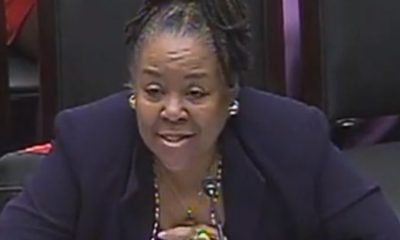Business
The American Dream Remains Deferred for Black Millennials
NNPA NEWSWIRE — “As I entered my 30s, still navigating what achieving the dream would mean, I wondered what other black millennials were feeling. I wanted to figure out what my generation of Black Americans thought about the promise of the American dream and how we can attain it,” said Reniqua Allen, the author of “It Was All a Dream.”
By Stacy M. Brown, NNPA Newswire Correspondent
@StacyBrownMedia
The American Dream is described as a national ethos: a set of ideals in which freedom includes the opportunity for prosperity and success, and upward social mobility for the family and children, achieved through hard work in a society with few barriers.
That’s the Wikipedia definition.
For African American millennials, the dream remains deferred – and in some cases, is a nightmare.
“The American Dream, the idea that anyone can succeed through hard work, is one of the most enduring myths in this country. And one of its most prominent falsehoods,” Reniqua Allen, the author of “It Was All a Dream” wrote in a recent New York Times Op-Ed.
“As I entered my 30s, still navigating what achieving the dream would mean, I wondered what other black millennials were feeling. I wanted to figure out what my generation of Black Americans thought about the promise of the American dream and how we can attain it,” Allen said.
Keli Hammond, the owner and CEO of Washington, D.C.-based B Classic Marketing & Communications and author of “Craved: the Secret Sauce to Building a Highly-Successful, Standout Brand,” said Black millennials have an uphill climb to achieve the American Dream.
“Unfortunately, this is a very true reality. Race is a touchy subject in this country – always has been, always will be,” Hammond said. “It’s funny because, even thought it’s part of our social construct, it’s still incredibly uncomfortable when it’s talked about.”
Hammond, who holds a bachelor’s degree in Advertising from Temple University and a certification in Change Leadership from Cornell University, noted that race has a way of humbling dreams quite fast.
“Although I believe that millennials in general are struggling to identify with the American Dream, for Black millennials it can often feel like a dream you can’t achieve,” she said.
“We weren’t afforded the same job opportunities or raises, we don’t have the same networks, we’re not given the same leeway if we make a mistake, and we don’t have the same access to capital or generational wealth – it’s hard every day,” Hammond said.
In a survey customized exclusively for NNPA Newswire, Branded Research asked 452 African Americans which aspect of the American Dream is most important.
A total of 30 percent said having a comfortable retirement; 21 percent said homeownership; 21 percent said setting up their children for success; 15 percent said owing a business; 7 percent said a college education; and 6 percent said having a nuclear family.
When broken down by gender, 22 percent of men and 34 percent of women said having a comfortable retirement was most important.
Twenty-two percent of men identified homeownership as most important as compared with 21 percent of women.
When broken down by age, 24 percent of those between 18 and 24 identified setting up their children for success was most important and 21 percent of the same age group said having a comfortable retirement and owning a business is paramount.
Twenty-eight percent of African Americans between 25 and 34 identified home ownership as most important followed by setting up their children for success (27 percent); and having a comfortable retirement (19 percent).
Overall, African American consumers are most likely to say that the most important aspects of the American Dream are having a comfortable retirement, homeownership and setting children up for success.
African American women are more likely than African American men to say that having a comfortable retirement is the most important aspect of the American Dream.
Younger African Americans value homeownership, setting up children for success and owning a business while older African Americans value a comfortable retirement most.
“The American Dream isn’t what I strive for [because] my goal is to be successful in my chosen creative path of singing and to travel the world doing that – not to be tethered to a job I don’t like, to pay a mortgage I don’t want in order to live permanently anywhere,” said New York musician Risa Branch.
“I finally paid off my student loans. I want the freedom to be wherever I want to be,” Branch said.
“If I did get the surplus funds to buy a house, I’d rent it out and use the investment to fund a more mobile lifestyle.”
Hammond argued that Black millennials want equality, opportunity and freedom. “We want the same business and home loans, we want the same job offers, we want the same – everything,” she said.
“I’m college-educated, well-read, and well-traveled. I’m a business owner and a homeowner, and even with all of that, I’m keenly aware that I am still very much an underdog,” Hammond continued.
“Freedom means you don’t struggle financially or live paycheck-to-paycheck. Freedom means you’re able to relax sometimes and not worry about all the ways that you have to work to dispel racial myths and stereotypes.”
Activism
Oakland Post: Week of April 24 – 30, 2024
The printed Weekly Edition of the Oakland Post: Week of April 24 – 30, 2024

To enlarge your view of this issue, use the slider, magnifying glass icon or full page icon in the lower right corner of the browser window. ![]()
Bay Area
State Controller Malia Cohen Keynote Speaker at S.F. Wealth Conference
California State Controller Malia Cohen delivered the keynote speech to over 50 business women at the Black Wealth Brunch held on March 28 at the War Memorial and Performing Arts Center at 301 Van Ness Ave. in San Francisco. The Enterprising Women Networking SF Chapter of the American Business Women’s Association (ABWA) hosted the Green Room event to launch its platform designed to close the racial wealth gap in Black and Brown communities.

By Carla Thomas
California State Controller Malia Cohen delivered the keynote speech to over 50 business women at the Black Wealth Brunch held on March 28 at the War Memorial and Performing Arts Center at 301 Van Ness Ave. in San Francisco.
The Enterprising Women Networking SF Chapter of the American Business Women’s Association (ABWA) hosted the Green Room event to launch its platform designed to close the racial wealth gap in Black and Brown communities.
“Our goal is to educate Black and Brown families in the masses about financial wellness, wealth building, and how to protect and preserve wealth,” said ABWA San Francisco Chapter President LaRonda Smith.
ABWA’s mission is to bring together businesswomen of diverse occupations and provide opportunities for them to help themselves and others grow personally and professionally through leadership, education, networking support, and national recognition.
“This day is about recognizing influential women, hearing from an accomplished woman as our keynote speaker and allowing women to come together as powerful people,” said ABWA SF Chapter Vice President Velma Landers.
More than 60 attendees dined on the culinary delights of Chef Sharon Lee of The Spot catering, which included a full soul food brunch of skewered shrimp, chicken, blackened salmon, and mac and cheese.
Cohen discussed the many economic disparities women and people of color face. From pay equity to financial literacy, Cohen shared not only statistics, but was excited about a new solution in motion which entailed partnering with Californians for Financial Education.
“I want everyone to reach their full potential,” she said. “Just a few weeks ago in Sacramento, I partnered with an organization, Californians for Financial Education.
“We gathered 990 signatures and submitted it to the [California] Secretary of State to get an initiative on the ballot that guarantees personal finance courses for every public school kid in the state of California.
“Every California student deserves an equal opportunity to learn about filing taxes, interest rates, budgets, and understanding the impact of credit scores. The way we begin to do that is to teach it,” Cohen said.
By equipping students with information, Cohen hopes to close the financial wealth gap, and give everyone an opportunity to reach their full financial potential. “They have to first be equipped with the information and education is the key. Then all we need are opportunities to step into spaces and places of power.”
Cohen went on to share that in her own upbringing, she was not guided on financial principles that could jump start her finances. “Communities of color don’t have the same information and I don’t know about you, but I did not grow up listening to my parents discussing their assets, their investments, and diversifying their portfolio. This is the kind of nomenclature and language we are trying to introduce to our future generations so we can pivot from a life of poverty so we can pivot away and never return to poverty.”
Cohen urged audience members to pass the initiative on the November 2024 ballot.
“When we come together as women, uplift women, and support women, we all win. By networking and learning together, we can continue to build generational wealth,” said Landers. “Passing a powerful initiative will ensure the next generation of California students will be empowered to make more informed financial decisions, decisions that will last them a lifetime.”
Business
Black Business Summit Focuses on Equity, Access and Data
The California African American Chamber of Commerce hosted its second annual “State of the California African American Economy Summit,” with the aim of bolstering Black economic influence through education and fellowship. Held Jan. 24 to Jan. 25 at the Westin Los Angeles Airport Hotel, the convention brought together some of the most influential Black business leaders, policy makers and economic thinkers in the state. The discussions focused on a wide range of economic topics pertinent to California’s African American business community, including policy, government contracts, and equity, and more.

By Solomon O. Smith, California Black Media
The California African American Chamber of Commerce hosted its second annual “State of the California African American Economy Summit,” with the aim of bolstering Black economic influence through education and fellowship.
Held Jan. 24 to Jan. 25 at the Westin Los Angeles Airport Hotel, the convention brought together some of the most influential Black business leaders, policy makers and economic thinkers in the state. The discussions focused on a wide range of economic topics pertinent to California’s African American business community, including policy, government contracts, and equity, and more.
Toks Omishakin, Secretary of the California State Transportation Agency (CALSTA) was a guest at the event. He told attendees about his department’s efforts to increase access for Black business owners.
“One thing I’m taking away from this for sure is we’re going to have to do a better job of connecting through your chambers of all these opportunities of billions of dollars that are coming down the pike. I’m honestly disappointed that people don’t know, so we’ll do better,” said Omishakin.
Lueathel Seawood, the president of the African American Chamber of Commerce of San Joaquin County, expressed frustration with obtaining federal contracts for small businesses, and completing the process. She observed that once a small business was certified as DBE, a Disadvantaged Business Enterprises, there was little help getting to the next step.
Omishakin admitted there is more work to be done to help them complete the process and include them in upcoming projects. However, the high-speed rail system expansion by the California High-Speed Rail Authority has set a goal of 30% participation from small businesses — only 10 percent is set aside for DBE.
The importance of Diversity, Equity and Inclusion (DEI) in economics was reinforced during the “State of the California Economy” talk led by author and economist Julianne Malveaux, and Anthony Asadullah Samad, Executive Director of the Mervyn Dymally African American Political and Economic Institute (MDAAPEI) at California State University, Dominguez Hills.
Assaults on DEI disproportionately affect women of color and Black women, according to Malveaux. When asked what role the loss of DEI might serve in economics, she suggested a more sinister purpose.
“The genesis of all this is anti-blackness. So, your question about how this fits into the economy is economic exclusion, that essentially has been promoted as public policy,” said Malveaux.
The most anticipated speaker at the event was Janice Bryant Howroyd known affectionately to her peers as “JBH.” She is one of the first Black women to run and own a multi-billion-dollar company. Her company ActOne Group, is one of the largest, and most recognized, hiring, staffing and human resources firms in the world. She is the author of “Acting Up” and has a profile on Forbes.
Chairman of the board of directors of the California African American Chamber of Commerce, Timothy Alan Simon, a lawyer and the first Black Appointments Secretary in the Office of the Governor of California, moderated. They discussed the state of Black entrepreneurship in the country and Howroyd gave advice to other business owners.
“We look to inspire and educate,” said Howroyd. “Inspiration is great but when I’ve got people’s attention, I want to teach them something.”
-

 Community2 weeks ago
Community2 weeks agoFinancial Assistance Bill for Descendants of Enslaved Persons to Help Them Purchase, Own, or Maintain a Home
-

 Activism3 weeks ago
Activism3 weeks agoOakland Post: Week of April 3 – 6, 2024
-

 Business2 weeks ago
Business2 weeks agoV.P. Kamala Harris: Americans With Criminal Records Will Soon Be Eligible for SBA Loans
-

 Activism2 weeks ago
Activism2 weeks agoOakland Post: Week of April 10 – 16, 2024
-

 Community2 weeks ago
Community2 weeks agoAG Bonta Says Oakland School Leaders Should Comply with State Laws to Avoid ‘Disparate Harm’ When Closing or Merging Schools
-

 Community1 week ago
Community1 week agoOakland WNBA Player to be Inducted Into Hall of Fame
-

 Community1 week ago
Community1 week agoRichmond Nonprofit Helps Ex-Felons Get Back on Their Feet
-

 Community2 weeks ago
Community2 weeks agoThe Year Ahead: Assembly Speaker Rivas Discusses Priorities, Problems
























































1 Comment